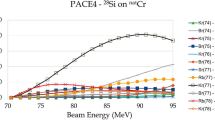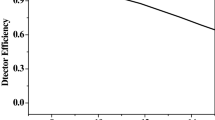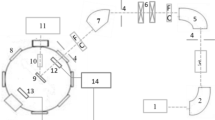Abstract
ABSOLUTE measurements have been made, it is believed for the first time, of the K X-ray quantum yields resulting from electron bombardment of solid targets containing the elements beryllium, boron, oxygen and fluorine. For beryllium and boron 99 per cent pure targets were used while beryllium oxide and lithium fluoride were used for the oxygen and fluorine yields; corrections were applied for electron and X-ray absorption in the beryllium and lithium respectively. The yields from carbon (graphite) and aluminium targets have also been measured.
This is a preview of subscription content, access via your institution
Access options
Subscribe to this journal
Receive 51 print issues and online access
$199.00 per year
only $3.90 per issue
Buy this article
- Purchase on Springer Link
- Instant access to full article PDF
Prices may be subject to local taxes which are calculated during checkout
Similar content being viewed by others
References
Archard, G. D., Proc. Second Symp. on X-ray Microscopy and X-ray Microanalysis, Stockholm, 331 (Elsevier, Amsterdam, 1961).
Burhop, E. H. S., The Auger Effect and Other Radiationless Transitions, Section 3.7 (Univ. Press, Cambridge, 1952).
Dolby, R. M., Brit. J. App. Phys., 11, 64 (1960).
Author information
Authors and Affiliations
Rights and permissions
About this article
Cite this article
CAMPBELL, A., GIBBONS, R. X-Ray Yields from Elements in the Range Beryllium to Aluminium. Nature 194, 76–77 (1962). https://doi.org/10.1038/194076b0
Issue Date:
DOI: https://doi.org/10.1038/194076b0
Comments
By submitting a comment you agree to abide by our Terms and Community Guidelines. If you find something abusive or that does not comply with our terms or guidelines please flag it as inappropriate.



